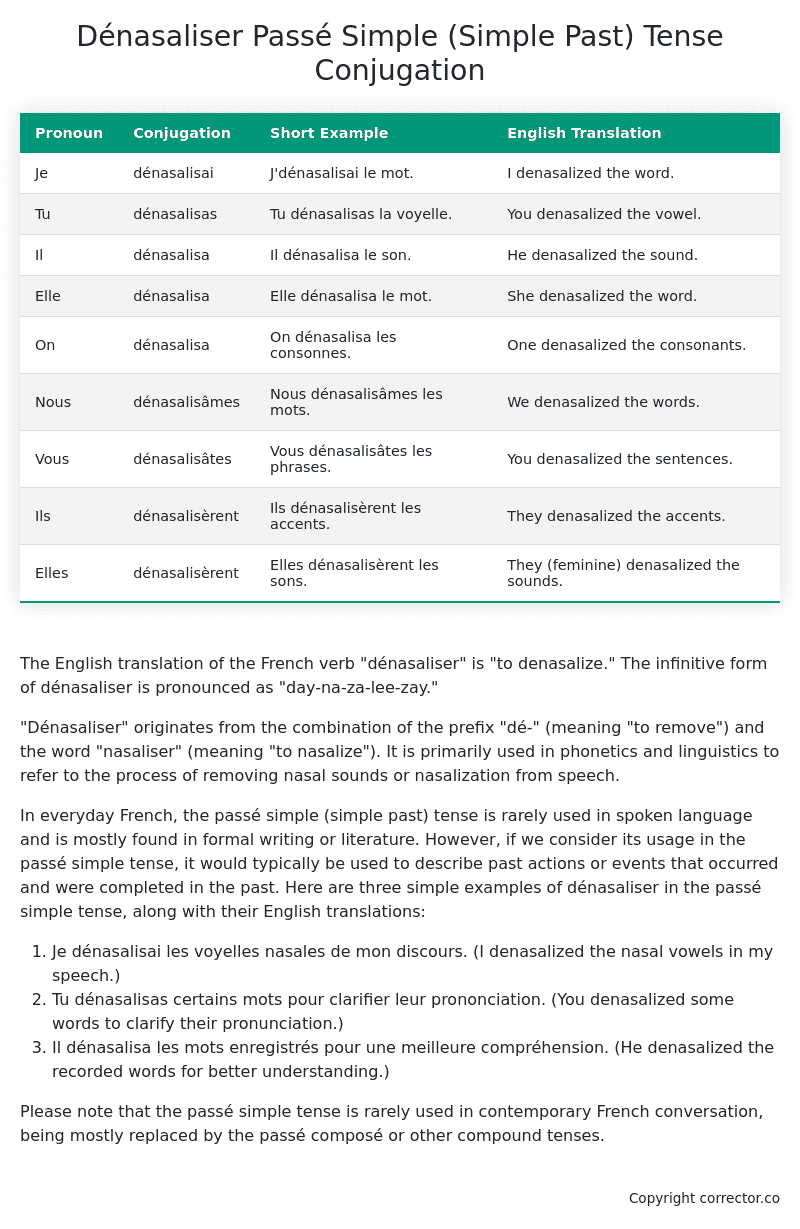Passé Simple (Simple Past) Tense Conjugation of the French Verb dénasaliser
Introduction to the verb dénasaliser
The English translation of the French verb “dénasaliser” is “to denasalize.” The infinitive form of dénasaliser is pronounced as “day-na-za-lee-zay.”
“Dénasaliser” originates from the combination of the prefix “dé-” (meaning “to remove”) and the word “nasaliser” (meaning “to nasalize”). It is primarily used in phonetics and linguistics to refer to the process of removing nasal sounds or nasalization from speech.
In everyday French, the passé simple (simple past) tense is rarely used in spoken language and is mostly found in formal writing or literature. However, if we consider its usage in the passé simple tense, it would typically be used to describe past actions or events that occurred and were completed in the past. Here are three simple examples of dénasaliser in the passé simple tense, along with their English translations:
- Je dénasalisai les voyelles nasales de mon discours.
(I denasalized the nasal vowels in my speech.) - Tu dénasalisas certains mots pour clarifier leur prononciation.
(You denasalized some words to clarify their pronunciation.) - Il dénasalisa les mots enregistrés pour une meilleure compréhension.
(He denasalized the recorded words for better understanding.)
Please note that the passé simple tense is rarely used in contemporary French conversation, being mostly replaced by the passé composé or other compound tenses.
Table of the Passé Simple (Simple Past) Tense Conjugation of dénasaliser
| Pronoun | Conjugation | Short Example | English Translation |
|---|---|---|---|
| Je | dénasalisai | J’dénasalisai le mot. | I denasalized the word. |
| Tu | dénasalisas | Tu dénasalisas la voyelle. | You denasalized the vowel. |
| Il | dénasalisa | Il dénasalisa le son. | He denasalized the sound. |
| Elle | dénasalisa | Elle dénasalisa le mot. | She denasalized the word. |
| On | dénasalisa | On dénasalisa les consonnes. | One denasalized the consonants. |
| Nous | dénasalisâmes | Nous dénasalisâmes les mots. | We denasalized the words. |
| Vous | dénasalisâtes | Vous dénasalisâtes les phrases. | You denasalized the sentences. |
| Ils | dénasalisèrent | Ils dénasalisèrent les accents. | They denasalized the accents. |
| Elles | dénasalisèrent | Elles dénasalisèrent les sons. | They (feminine) denasalized the sounds. |
Other Conjugations for Dénasaliser.
Le Present (Present Tense) Conjugation of the French Verb dénasaliser
Imparfait (Imperfect) Tense Conjugation of the French Verb dénasaliser
Passé Simple (Simple Past) Tense Conjugation of the French Verb dénasaliser (You’re reading it right now!)
Passé Composé (Present Perfect) Tense Conjugation of the French Verb dénasaliser
Futur Simple (Simple Future) Tense Conjugation of the French Verb dénasaliser
Futur Proche (Near Future) Tense Conjugation of the French Verb dénasaliser
Plus-que-parfait (Pluperfect) Tense Conjugation of the French Verb dénasaliser
Passé Antérieur (Past Anterior) Tense Conjugation of the French Verb dénasaliser
Futur Antérieur (Future Anterior) Tense Conjugation of the French Verb dénasaliser
Subjonctif Présent (Subjunctive Present) Tense Conjugation of the French Verb dénasaliser
Subjonctif Passé (Subjunctive Past) Tense Conjugation of the French Verb dénasaliser
Subjonctif Imparfait (Subjunctive Imperfect) Tense Conjugation of the French Verb dénasaliser
Conditionnel Présent (Conditional Present) Tense Conjugation of the French Verb dénasaliser
Conditionnel Passé (Conditional Past) Tense Conjugation of the French Verb dénasaliser
Conditionnel Passé II (Conditional Past II) Tense Conjugation of the French Verb dénasaliser
L’impératif Présent (Imperative Present) Tense Conjugation of the French Verb dénasaliser
L’impératif Passé (Imperative Past) Tense Conjugation of the French Verb dénasaliser
L’infinitif Présent (Infinitive Present) Tense Conjugation of the French Verb dénasaliser
L’infinitif Passé (Infinitive Past) Tense Conjugation of the French Verb dénasaliser
Le Participe Présent (Present Participle) Tense Conjugation of the French Verb dénasaliser
Le Participe Passé (Past Participle) Tense Conjugation of the French Verb dénasaliser
Struggling with French verbs or the language in general? Why not use our free French Grammar Checker – no registration required!
Get a FREE Download Study Sheet of this Conjugation 🔥
Simply right click the image below, click “save image” and get your free reference for the dénasaliser Passé Simple tense conjugation!

Dénasaliser – About the French Passé Simple (Simple Past) Tense
Formation
Usage
Narration
Historical Context
Interactions with other tenses
Passé Composé
Imparfait
Conditional and Subjunctive
Summary
I hope you enjoyed this article on the verb dénasaliser. Still in a learning mood? Check out another TOTALLY random French verb conjugation!


